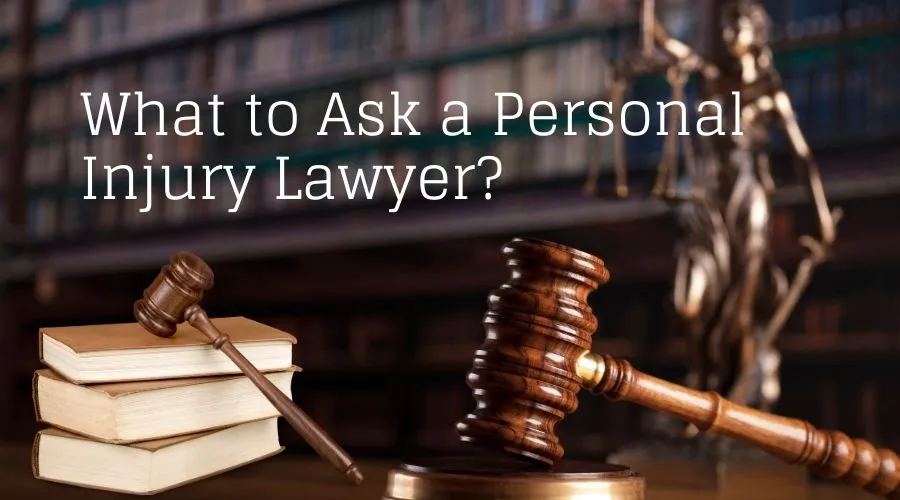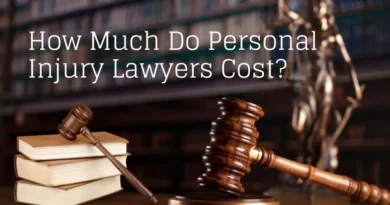What to Ask a Personal Injury Lawyer? 9 Important Questions
When you’ve been involved in an accident or suffered an injury due to someone else’s negligence, seeking legal representation becomes crucial. Personal injury lawyers specialize in helping individuals navigate the complex legal process, ensuring they receive the compensation they deserve.
However, choosing the right personal injury lawyer can be overwhelming, especially when you need to know what questions to ask. This article will discuss the essential questions to ask a personal injury lawyer to ensure you make an informed decision about legal representation.
Importance of Hiring a Personal Injury Lawyer
Before delving into the questions, it’s essential to understand the significance of hiring a personal injury lawyer. Personal injury cases can be complex, involving intricate legal procedures, insurance companies, and negotiations. A skilled personal injury lawyer will have the expertise and experience to handle your case effectively, increasing your chances of obtaining fair compensation for your injuries, medical bills, lost wages, and emotional distress.
9 Questions to Ask Before Hiring a Personal Injury Lawyer
1) Experience and Expertise

Hiring a lawyer with relevant experience and expertise is crucial for the success of your case. Ask about their experience in handling personal injury cases similar to yours. Some questions to consider asking include the following:
- How long have you been practicing personal injury law?
An experienced lawyer will likely have a deeper understanding of the legal nuances and strategies involved in personal injury cases. - Have you handled cases similar to mine before?
A lawyer who has dealt with cases similar to yours will be familiar with the challenges and potential solutions specific to your situation. - What is your success rate in personal injury cases?
While past results can’t guarantee future outcomes, a lawyer with a strong track record of successful settlements or verdicts indicates their competence and ability to advocate for their clients effectively. - Are you familiar with the local laws and regulations?
Laws and regulations can vary from one jurisdiction to another. A lawyer well-versed in the specific laws governing your case’s jurisdiction can provide valuable insights and guidance.
2) Case Assessment and Strategy
Understanding how the lawyer assesses cases and develops a strategy is essential. Ask about the strengths and weaknesses of your case, the potential legal avenues that can be pursued, and the estimated timeline for resolving your case. A competent lawyer will provide a clear assessment of your situation, helping you understand the potential outcomes and the steps involved in pursuing your claim.
3) Fee Structure and Payment
Discuss the lawyer’s fee structure upfront to avoid any surprises later. This transparency will help you plan financially and understand your financial obligations. Here are some questions to help you understand the financial aspects:
- How do you charge for your services?
Lawyers may charge on an hourly basis or work on a contingency fee basis, where they receive a percentage of the compensation awarded if you win the case. Understanding the fee structure helps you plan accordingly. - Will I have to pay any upfront costs?
Some lawyers may require you to cover expenses such as filing or expert witness fees. Knowing these upfront costs helps you prepare financially. - Are there any additional fees or expenses I should be aware of?
Apart from attorney fees, there might be additional costs like court fees, investigation expenses, or medical record retrieval fees. Being aware of these potential expenses enables you to budget effectively.
4) Communication and Accessibility
Effective communication is vital during the legal process. Inquire about who will handle your case and whether they will be accessible for questions or concerns. A responsive and communicative lawyer will provide you with peace of mind and keep you informed throughout your case. Here are some questions to ensure a smooth flow of information:
- How often will we communicate about my case?
Establishing a communication schedule helps manage expectations and ensures you’re kept informed about the progress of your case. - What is the best way to reach you?
Understanding the lawyer’s preferred method of communication allows you to reach out when necessary. - Will I have direct access to you or your team?
Some firms have a team of lawyers and support staff. Clarifying who will handle your inquiries and concerns ensures you know who to contact when needed.
5) Track Record and Success Rate
A lawyer’s track record and success rate indicate their ability to handle personal injury cases successfully. Ask about their past settlements and verdicts, specifically in similar cases. Inquire about any disciplinary actions or complaints filed against them. Lawyers with a proven track record of achieving favorable client results demonstrate their competence and commitment to obtaining the best possible outcome.
6) Gathering Information and Documentation
To provide your lawyer with the necessary information for your case, be prepared to gather relevant documentation such as medical records, accident reports, photographs, witness statements, and any other evidence related to your injury. This information will help your lawyer build a strong case on your behalf.
7) Understanding the Legal Process
Your personal injury lawyer should guide you through the legal process and explain each step. Understanding the legal process will help you make informed decisions and alleviate confusion or anxiety. Here are some questions to help you gain clarity:
- What is the statute of limitations for personal injury cases?
Statutes of limitations impose time limits on filing personal injury claims. Knowing the deadline ensures you take advantage of the opportunity to seek compensation. - What are the potential outcomes of my case?
While no lawyer can predict the exact outcome, they can provide an overview of the potential scenarios based on the facts and circumstances of your case. - How long does it typically take to resolve a personal injury case?
Personal injury cases can vary in duration, but an experienced lawyer can provide an estimate based on their knowledge of the legal process and the complexities involved. - Will you handle my case personally or delegate it to someone else?
It’s crucial to know whether the lawyer you’re speaking with will personally handle your case or pass it on to another member of their team.
8) Negotiation and Settlement
Many personal injury cases are settled outside court through negotiations with insurance companies or the at-fault party. Ask your lawyer about their negotiation strategy and experience in securing fair client settlements. A skilled negotiator will work diligently to maximize your compensation while protecting your rights.
- What is your approach to negotiating settlements?
Understanding how the lawyer approaches settlement negotiations gives you an idea of their strategy and willingness to fight for the compensation you deserve.
9) Trial Preparation and Representation
In some cases, a trial becomes necessary to ensure fair compensation. Ask your lawyer about their trial experience and their approach to trial preparation. Inquire about their courtroom strategies and how they plan to present your case effectively. A well-prepared and confident lawyer in the courtroom will advocate for your rights and fight for the compensation you deserve.
- Will you recommend going to trial if necessary?
While settlements are often preferred to avoid lengthy legal proceedings, knowing if the lawyer is prepared to take your case to trial if a fair settlement cannot be reached is essential. - What factors determine whether to settle or go to trial?
Factors such as the strength of the evidence, the potential compensation amount, and the likelihood of success at trial can influence the decision to settle or proceed to trial.
Role of Personal Injury Lawyers in Obtaining Compensation
Personal injury lawyers are crucial in helping you obtain the compensation you deserve. They will investigate your case, gather evidence, negotiate with insurance companies, calculate damages, and advocate for your rights in court, if necessary. Their expertise and guidance can significantly impact the outcome of your case and ensure you receive fair compensation for your injuries.
Common Misconceptions about Personal Injury Lawyers
Some common misconceptions include lawyers being expensive, unnecessary, or only interested in their fees. In reality, personal injury lawyers work on a contingency fee basis, ensuring their clients can afford legal representation. They are crucial in navigating the legal complexities and protecting your rights.
Tips for Choosing the Right Personal Injury Lawyer
To choose the right personal injury lawyer, consider the following tips:
- Seek recommendations from friends, family, or trusted professionals.
- Research potential lawyers and read client reviews.
- Schedule consultations to assess their expertise and communication style.
- Ask relevant questions to gauge their suitability for your case.
- Trust your instincts and choose a lawyer you feel comfortable working with.


